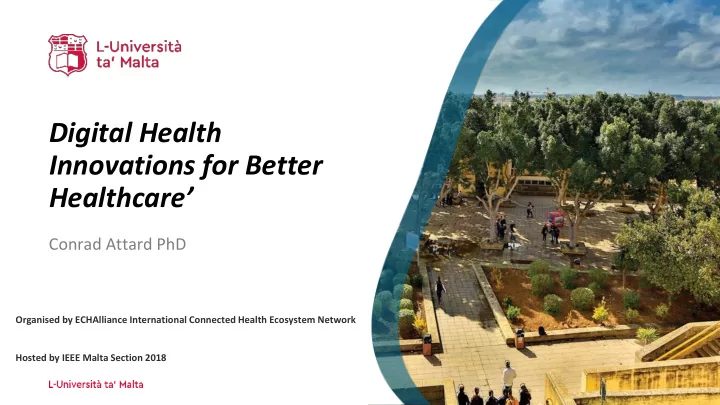

Digital Health Innovations for Better Healthcare’ Conrad Attard PhD Organised by ECHAlliance International Connected Health Ecosystem Network Hosted by IEEE Malta Section 2018
Digital Innovation through Academic ICT 20 th November 2019
Challenges o Healthcare is full of challenges. o If you like challenges here is your place! o Medial research o Complex Healthcare o Human beings o Technology o Healthcare tend to resist change.
• Knowledge Transfer Office • RSSD/Project Support • RIDT • University Academia UG PG ____ • Dementia • Diabetes • Biobanking • Bioinformatics • Brain Computer Interface (BCI) technology • Mental Health
The Knowledge Transfer Office The Knowledge Transfer Office (KTO) has a skilled and experienced team that actively works to provide advice and assistance in areas related to: ➢ Technology Transfer and Protecting Intellectual Property (IP) ➢ Collaborations with Industry, and ➢ Funding for Proof of Concept and Commercialisation
The Knowledge Transfer Office
How UM Collaborates with Industry ➢ Collaborative R&D ➢ Joint applications for funding ➢ Licensing of existing UM technology ➢ Study and work placements (DegreePlus) ➢ Donations (RIDT) ➢ Consultancy / Laboratory Services (MUC/RSSD) 7
Projects o Pinata (Pervasive Nursing And docToral Assistant), a prior project within the field of digital health. o Aim was to provide monitoring for Ambient Assisted Living (AAL) in the Health and Remote Home Care sectors. o Allows for the movement and interaction of medical staff and patients to be tracked and directs staff towards emergencies as they arise.
RIDT The University of Malta Research Innovation and Development Trust (‘RIDT’) was established by the Government of Malta in 2011 as an integral component of Malta’s established policy to bolster investment in research and development on a national level. It is intended to attract funds from private and corporate bodies to be used to maximise and exploit the research milieu at the University of Malta, and to foster the commercial exploitation of research. Since its setting up, the RIDT has managed to engage with various sectors of the Maltese society and to raise the much needed awareness about the benefits of university research and the need to support it. This engagement has led to a number of community-financed initiatives and projects including, amongst others, PhD scholarships in cancer research and in climate change, a kidney research programme, research projects in engineering, a fully-fledged mobile dental clinic, and a research programme in the genetics of osteoporosis.
RSSD 1) Development of a novel device to support children with language impairment in a bilingual context (SPEECHIE) 2) Thermal Imaging for Peripheral Vascular Disease Monitoring in Diabetics (TIPMID) Funded through MCST R&I-2013-028. https://www.timesofmalta.com/articles/view/20180610/life-features/preventing-foot- complications-in-diabetes.681333 Ref:http://mcst.gov.mt/ri-programmes/fusion/technology-development-programme/funded-projects/#1506083411859- 15d1c2e4-f5fe
RIDT Connecting for Health: Building IT Communication Pathways for Citizen Participation in Biomedical and Genomic Research Supported by the Vodafone Foundation with a donation of €100,000 The project will see the development of a specialised interactive web portal and mobile app which will encourage and facilitate people’s participation at the Biobank and act as a link between the general public, researchers and patients. The funding will be made available through the Research Trust (RIDT) of the University of Malta. The Malta Biobank within the University of Malta provides high quality blood and tissue samples used to investigate important diseases. Certain types of conditions, such as diabetes, heart disease and the blood disorder known as thalassaemia have, for some reason, a significantly higher incidence rate amongst the Maltese population than amongst our European counterparts. Research into the local population’s genetic make -up can help shed light on whether the Maltese are more predisposed towards developing certain mutations which lead to such diseases. It can also help facilitate effective treatment.
RIDT o Adaptive Virtual Reality o Supported by the Vodafone Foundation with a donation of € 113,000 o The project aims to develop cutting-edge technology involving virtual reality to reduce pain without the use of medication in children undergoing painful, high-stress hospital procedures.
Pervasive Electronic Monitoring in Healthcare The aim of this project is to increase the quality of life of People with Dementia (PwD) by assisting them in their daily life activities as well as enabling their social engagement with other persons that include care-givers, family members as well as other members within their community. Given that PwD may struggle in their daily live activities, this research investigates how quality of life technology can improve the way formal carers monitor PwD.
Academic Entities 14 Faculties 18 Institutes 12 Centres 3 Schools Junior College
Student Population o Around 11,500 students o Over 3,000 graduands each year o 1,071 international students from 90+ countries in 2018 (excluding ERASMUS) o 2,000 pre-tertiary students at Junior College
Academic Life o 1,100 academics (many involved in outreach) o Teaching, Research, Partnering International Institutions o Research, Innovation & Development Trust
An evolving organisation o New infrastructure to cater for increasing students o Sporting Facilities o Accommodation centre on campus o Well Being Centre o Satellite campuses
Get in touch www.um.edu.m t Conrad.attard@ 2340 2340 um.edu.mt /um.cis.ict /uniofmalta /universityofmalta /school/university-of-malta
Recommend
More recommend